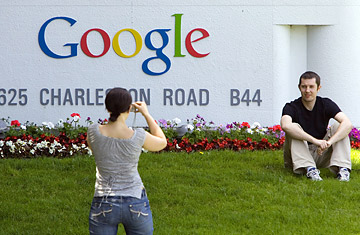
Thanks to a new Google project, soon any website can be its own Facebook.
Upping the stakes in its ongoing battle with the popular social network, Google announced today that it was getting into the "social plumbing" business — giving every website a way to add a limitless number of applications and a means for those sites' users to communicate among themselves.
The initiative is called Friend Connect and it begins tonight when any site can apply to be in the Google pilot program (they call it a "preview release") here. Note: that site won't be live until Monday night. During the next few days, Google will choose one or two dozen sites to participate. Over the course of the next several months, the company will collect site, user and developer feedback on how the program is working. Then, if all goes well, in a few months Google will open up Friend Connect to any website or blog that wants to participate.
Here's how it'll work. (And forgive me for using my blog as an example; we need the traffic.)
My wife and I have a teensy blog that covers real estate and other stuff of interest to people in our hometown in Northern California. It's hosted via Blogger, which happens to be Google's free hosting service. (The Friend Connect program, however, is open to any website or blog — you'll just have to cut and paste a few lines of code onto your site.) Anyway, when we first set up the blog, we chose from a short a la carte menu of standard features we wanted to add — things like "blogrolls" which recommend our favorites blogs, post archives, pictures and so on.
Once Friend Connect is up and running on blogs, however, we'll be able to go to a page and choose from thousands of applications, and add them, free, to our site. (Here's a list of some of the applications. As Friend Connect grows, expect the list of applications to explode; Google, like Facebook before it, is trying to create a "platform" for developers to make money by reaching an audience of millions.)
But users will have to sign in if they want to use all those cool new apps. How? Google's using a standard known as OpenID, which many of the world's biggest sites — from Google (of course) to AOL — utilize. So, for instance, sign into AOL, or your g-mail account, and you're logged into Friend Connect. One of the advantages of this system is it makes it easier for users to take their friend lists with them. Having signed in, users can follow the activities of their friends on Friend Connect sites. So, in my real estate blog example, if I installed a Wall app (just like the one on Facebook) people could comment on stories. However, those comments would only be visible to their friends; if a user didn't sign in, they wouldn't even see the Wall.
Better yet, as Friend Connect picks up steam, perhaps some applications developer will create a specialized app for all the real estate blogs out there (there are tons of them) and make it easier for, say, real estate agents and home sellers to connect with home buyers. Or, consumers searching out contractors in a specific area.
If Friend Connect works, the ramifications are huge, of course. It's another smart move for Google, which would be able to serve up even more targeted advertising to users — and make even more money. Through a project called OpenSocial, Google has been working to fight back against Facebook's closed network while mimicking, on the wide-open Web, Facebook's core advantages — Facebook is a place where a user not only defines his or her set of friends, but the applications he or she wants to use. Those two things — your friend list and the things you like to do — create a pretty good idea of who you are, which is priceless to advertisers. Only five months in, 2008 is shaping up to be a pivotal year in the Web's development. I can't wait to see what happens next.
